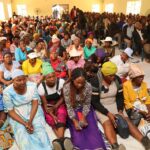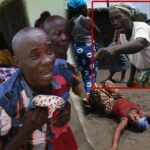Harare – President Emmerson Mnangagwa is set to deliver a State of the Nation Address (SONA) on Wednesday, 2 October 2024, at 2 PM.
The announcement, made by Speaker of Parliament Jacob Mudenda in an Extraordinary Government Gazette, confirms that the President will address a joint sitting of the Senate and the National Assembly.
This address will outline the government’s legislative agenda for the Second Session of the Tenth Parliament, as mandated by Section 140(1) and (4) of the Constitution. This will be President Mnangagwa’s second SONA since his re-election in August of the previous year.
The address comes at a critical juncture for Zimbabwe, as the nation grapples with a deteriorating economic environment. Soaring prices, a rapidly devaluing local currency (ZiG), and persistent electricity shortages are just some of the challenges facing ordinary Zimbabweans.
The timing of this address is crucial. The President is expected to address these pressing economic concerns and outline the government’s plans to mitigate the impact on citizens.
He will likely touch upon the government’s efforts to combat what he has previously termed “acts of economic sabotage, speculative and counter-productive tendencies by those who thrive on greed and profiteering.”
The President has consistently maintained that his government is committed to “opening up pathways for sustainable economic growth and development” despite the challenges posed by sanctions, climate change, and global economic disruptions.
The devaluation of the ZiG has raised questions about the government’s claims of a “gold-backed” currency supported by substantial foreign exchange reserves. Initially, upon the launch of the ZiG on 5 April, RBZ Governor John Mushayavanhu asserted that the currency was backed by gold reserves (1.1 tonnes domestically and 1.5 tonnes abroad), US$100 million in cash, and other precious minerals, totalling US$285 million.
This was touted as “more than three times the cover for the ZiG currency being issued.” However, the recent devaluation and the RBZ’s subsequent measures to tighten money supply – raising the bank rate policy to 35% and increasing statutory reserve requirements – suggest a different reality. Independent economists estimate that the ZiG has lost almost 50% of its value, raising concerns about a potential freefall and collapse.
The President’s address will also likely touch upon the outcomes of the recent SADC Summit held in Harare, where the call for the unconditional removal of sanctions imposed on Zimbabwe was reiterated. He may also address internal party matters, particularly the need for unity within ZANU PF and decisive action against “unruly elements” who use media platforms to “cause alarm and despondency.”
He has previously emphasised the importance of upholding the party’s principles and objectives and called for a focus on “scaling up production, productivity and hard honest work across all sectors of the economy.”
The upcoming 21st National People’s Conference in Bulawayo, themed “Industrialise and Modernise Towards the Attainment of Vision 2030,” is also expected to feature in the President’s address. The conference coincides with SADC’s Anti-Sanctions Day on 25 October and is likely to be used as a platform to further advocate for the lifting of sanctions.
Another pressing national issue is the rampant load shedding that has literally blacked out the country as most areas are going for 16 to 18 hours without electricity at least three to four times every week. However, it is unlikely that the SONA will directly mention how the Zanu PF government is going to solve this national crisis anytime soon as the situation is likely going to get worse since the Zambezi River Authority (ZRA) is expected to instruct Zimbabwe to shut down the Kariba South Hydro Power Station within the next coming weeks due to dwindling levels of water in Kariba Dam. This would mean that Zimbabwe will lose about 220 mega watts that the power station is feeding the national grid with daily, though it has a maximum power generation supply of about 1000 mega watts.
The nation awaits President Mnangagwa’s address with bated breath. His words will be closely scrutinized for concrete solutions to the current economic crisis and a clear roadmap for the future.

Follow @MyZimbabweNews












